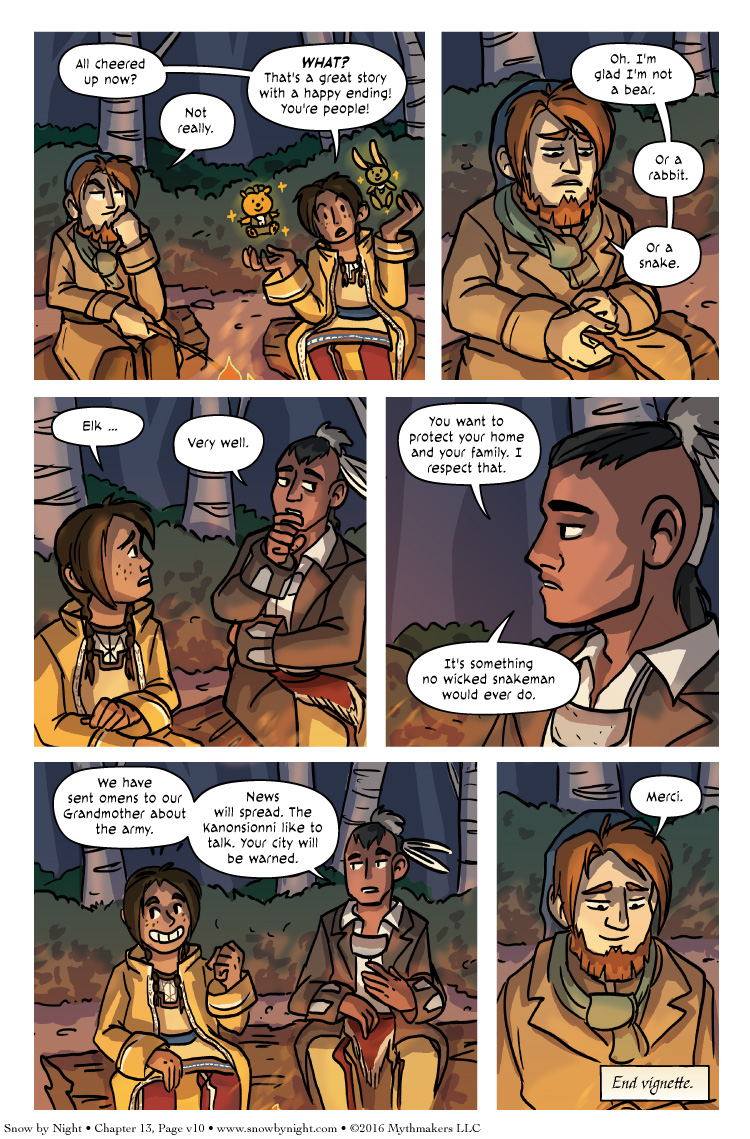How We Decided You’re People Page 10
October 10th, 2016An interesting wrinkle in English, the contraction “you’re” can stand for “you are” or “you were.” You can’t tell the tense without context. In a title, there aren’t any such context clues. I took advantage of that for this vignette so that the title could be read either way. There are two council fires in this vignette. One happened a century ago at White Oak. The other is happening this night around a campfire along the Mauritz River. One past tense; one present.
My thanks to Mittie Paul for illustrating this vignette! She did fantastic job with this vignette that ventured from serious to silly to poignant. Thank you, Mittie!
Chapter 14, which is titled Revelations and a Nocturne, begins on Wednesday! You can see Julie’s lines for the chapter cover when you vote for Snow by Night on Top Web Comics.




I’m pretty sure that you’re can’t be used as a contraction for you were- I did a search and found a few sources that said it couldn’t, and none that said it could. I’ve certainly never heard it used that way as a native speaker. It’s not a huge deal (especially since the sentence is grammatically correct regardless), but I have to disagree with you on that particular issue.
Long time lurker, kinda sad that this is my first comment xD Regardless of the grammar nazism, I really do love this comic. And I love the how the story has changed over the years. I look forward to picking up the main storyline again!
Can’t is such a strong word when dealing with English, especially when dealing with contractions that are inherently slangy. The title reflects Toothy Kit’s rather low-register manner of speaking. Plus as a native speaker, I’m purposefully obfuscating to which instance the title is referring. The contraction and its slight nebulousness works for my purposes here.
Ch14 awaits! I’m posting the splash cover this afternoon. :-)
Thanks! That was a lovely story.
Aww, Kit, it was a cute story. But maybe, “let me tell you a story about your people to take your mind off your people and how they are probably going to be attacked and maybe murderkilled to death” just wasn’t going to be the most effective plan anyway. (But it got Elk to comfort him, so maybe it worked in the end.)
I admit…I have never heard of “you’re” also being a contraction for “you were”…
Yay, Elk saves the day!
Loved the story, but wrt the title I have to agree with maeverin – /you’re/ is always just /you are/ in English. To a native speaker there’s no double-meaning.
(And even if it could be read as /you *were*/, that wouldn’t work – if anything, it would imply that the standing had changed between then and now – ie that the Liranequois had decided the Japethians were human in the past – but weren’t now.)
Using the past tense of the subject verb is what makes it clear that the statement is reffering to something in the past. The ‘are’ in ‘you’re’ simply modifies the object.
On the other hand, as a native speaker, while it’s not formally correct, in casual speech you’re frequently doubles for you were as well as you are.
I guess since you’ve never heard of it, that means you’re (you were) late learning about it.
Honestly, though, the tendency is to infer it’s present-tense, and therefore that is also the tendency when it comes to what’s implied by it.